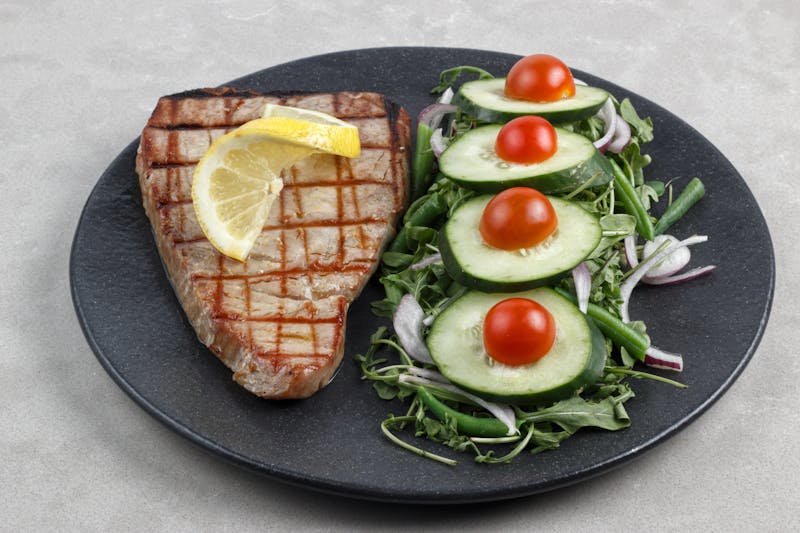The Rising Popularity of Vegetarian Diets
In recent years, vegetarianism has grown in popularity—not only as a lifestyle choice but as a means to improve health, promote sustainability, and even support animal welfare. Whether you’re transitioning to a meatless diet or simply seeking to incorporate more plant-based meals, vegetarian cuisine offers endless possibilities that are both healthy and delicious. A well-balanced vegetarian diet can provide all the essential nutrients your body needs, along with the added benefits of heart health, weight management, and reduced inflammation. So, how can you make the most of a vegetarian diet? Let’s dive into the vibrant world of plant-based eating.
Why Choose a Vegetarian Diet?
Adopting a vegetarian diet isn’t just about eliminating meat—it’s about embracing a more nutrient-dense, fiber-rich way of eating. The reasons for choosing a vegetarian diet vary from person to person, but they typically include health benefits, environmental concerns, and ethical reasons.
Health Benefits of a Vegetarian Diet
A vegetarian diet is linked to numerous health benefits. Research suggests that people who follow plant-based diets are at a lower risk for chronic diseases such as heart disease, high blood pressure, type 2 diabetes, and certain cancers. Vegetarian diets are typically rich in vegetables, fruits, legumes, and whole grains, all of which are packed with vitamins, minerals, and fiber that contribute to overall health.
Environmental and Ethical Considerations
Beyond the personal health benefits, choosing a vegetarian diet can have a positive impact on the environment. Meat production is resource-intensive, requiring large amounts of water and energy, and contributes significantly to greenhouse gas emissions. By choosing plant-based meals, you can reduce your carbon footprint and contribute to the well-being of the planet. Additionally, many people choose vegetarianism for ethical reasons, as it aligns with a belief in animal rights and reducing animal suffering.
Key Nutrients in a Vegetarian Diet
A well-balanced vegetarian diet can meet all of your nutritional needs, but it’s essential to be mindful of key nutrients that may require special attention.
Protein: Vital for Muscle and Growth
Protein is often the first nutrient people think of when they consider cutting out meat, but don’t worry—there are plenty of plant-based sources of protein! Beans, lentils, tofu, tempeh, quinoa, and nuts are all excellent sources of plant-based protein. These foods provide the amino acids necessary for muscle repair, immune function, and overall cell health.
Iron: Ensuring Optimal Health
Iron is a critical mineral in the body, especially for maintaining healthy blood and preventing anemia. While meat is a well-known source of iron, plant-based foods like lentils, chickpeas, tofu, spinach, and fortified cereals are great sources of iron as well. Pairing iron-rich foods with vitamin C—found in citrus fruits, bell peppers, and broccoli—can improve the absorption of iron from plant sources.
Omega-3 Fatty Acids: Good Fats for Heart Health
Omega-3 fatty acids are essential fats that play a key role in brain function, heart health, and reducing inflammation. While they are commonly found in fatty fish, vegetarians can obtain omega-3s from sources like flaxseeds, chia seeds, walnuts, and algae-based supplements.
Vitamin B12: Overcoming Deficiency Concerns
Vitamin B12 is primarily found in animal products, which can make it a concern for those on a vegetarian diet. However, there are plant-based sources of B12, such as fortified cereals, plant-based milks, and nutritional yeast. In some cases, supplementation may be necessary to ensure adequate intake.
Delicious Vegetarian Meal Ideas for Every Day
Vegetarian meals don’t have to be bland or boring. From savory breakfasts to hearty dinners, there are endless ways to create meals that are both nutritious and satisfying.
Breakfast: Avocado and Spinach Toast
Start your day with a nutrient-packed breakfast that’s quick, easy, and delicious. Avocado toast with spinach is a perfect example of a balanced vegetarian breakfast.
Ingredients and Preparation
- 1 ripe avocado
- 1 cup spinach
- 2 slices whole grain bread
- Olive oil, salt, and pepper to taste
Instructions:
- Toast the whole grain bread.
- In a pan, sauté spinach with a drizzle of olive oil until wilted.
- Mash the avocado with salt and pepper and spread it on the toasted bread.
- Top with sautéed spinach and a drizzle of olive oil.
Nutritional Benefits
This breakfast is high in fiber, healthy fats, and antioxidants. The whole-grain bread provides complex carbohydrates, while the avocado offers heart-healthy fats, and the spinach adds a dose of iron and vitamin C.
Lunch: Quinoa and Roasted Vegetable Salad
For lunch, try a colorful and filling salad made with quinoa and roasted vegetables. This dish is rich in protein, fiber, and healthy fats.
Ingredients and Preparation
- 1 cup quinoa
- 1 zucchini, chopped
- 1 red bell pepper, chopped
- 1/2 cup cherry tomatoes, halved
- 1 tablespoon olive oil
- Salt, pepper, and herbs for seasoning
Instructions:
- Cook the quinoa according to package instructions.
- Roast the vegetables in the oven at 400°F (200°C) for 20 minutes, seasoning with olive oil, salt, pepper, and herbs.
- Toss the cooked quinoa with the roasted vegetables and top with fresh herbs.
Nutritional Benefits
This salad is a great source of plant-based protein from quinoa, along with fiber, vitamins, and minerals from the vegetables. The olive oil adds healthy fats, while the tomatoes provide antioxidants.
Dinner: Lentil and Chickpea Stew
A comforting and hearty stew, perfect for dinner. This dish is packed with protein, fiber, and essential nutrients to keep you satisfied.
Ingredients and Preparation
- 1 cup lentils
- 1 cup chickpeas (cooked or canned)
- 1 onion, chopped
- 2 carrots, chopped
- 2 celery stalks, chopped
- 4 cups vegetable broth
- Salt, pepper, and cumin to taste
Instructions:
- Sauté the onions, carrots, and celery in a pot until softened.
- Add the lentils, chickpeas, vegetable broth, and spices, then bring to a boil.
- Simmer for 30 minutes or until the lentils are tender.
Nutritional Benefits
This stew is an excellent source of protein and iron, thanks to the lentils and chickpeas. The vegetables provide a range of vitamins and minerals, and the vegetable broth adds flavor without extra calories.
Snack: Hummus and Veggie Sticks
For a light snack, try pairing hummus with crunchy veggie sticks. This snack is rich in healthy fats, protein, and fiber.
Ingredients and Preparation
- 1 cup hummus
- Carrot sticks, cucumber sticks, and bell pepper strips
Instructions:
- Prepare the veggies by cutting them into sticks.
- Serve with a generous portion of hummus for dipping.
Nutritional Benefits
This snack is a great combination of healthy fats from the hummus (made with olive oil and tahini) and fiber from the vegetables. It’s perfect for a midday energy boost.
Tips for Maintaining a Balanced Vegetarian Diet
To make the most of your vegetarian diet, it’s essential to plan meals wisely and be mindful of key nutrients.
Meal Planning for Variety and Nutrition
Ensure your meals are varied by incorporating a range of vegetables, whole grains, legumes, nuts, and seeds. This helps to cover all your nutrient bases while keeping meals interesting.
Smart Supplementation for Key Nutrients
If you’re concerned about potential nutrient gaps (like vitamin B12 or omega-3s), consider incorporating supplements into your routine to ensure you’re meeting all of your needs.
Cooking Techniques to Maximize Nutrient Absorption
To get the most out of your vegetarian meals, use cooking methods that preserve nutrients. Steaming vegetables, soaking beans, and lightly sautéing greens can help maintain their nutritional value.
Overcoming Challenges in a Vegetarian Diet
While a vegetarian diet offers many benefits, it’s not without its challenges. Here are some common hurdles and how to overcome them.
Dealing with Protein and Iron Deficiency
To prevent protein and iron deficiencies, include a variety of plant-based protein sources in your diet. Pair iron-rich foods with vitamin C to enhance absorption.
Handling Social Situations and Eating Out
Eating out as a vegetarian can be tricky, but most restaurants offer vegetarian-friendly options. Don’t hesitate to ask about substitutions or modifications to make a dish vegetarian.
Conclusion: Enjoying a Nutritious Vegetarian Lifestyle
Adopting a vegetarian diet is a rewarding way to improve your health, support the environment, and enjoy delicious meals. With careful planning and a focus on variety, a vegetarian lifestyle can be both satisfying and nourishing. Remember to balance your meals, pay attention to key nutrients, and explore creative ways to enjoy plant-based dishes.

Frequently Asked Questions (FAQs)
- Is a vegetarian diet suitable for weight loss? Yes, a vegetarian diet can help with weight loss if it’s balanced and includes whole, minimally processed foods.
- How can I get enough protein on a vegetarian diet? You can get protein from plant-based sources like beans, lentils, tofu, tempeh, and quinoa.
- Can I get enough iron from a vegetarian diet? Yes, you can get iron from plant foods such as lentils, spinach, chickpeas, and fortified cereals.
- Do I need to take supplements on a vegetarian diet? It’s often recommended to take vitamin B12 and possibly omega-3 supplements, as these nutrients can be harder to get from a vegetarian diet.
- Can vegetarian meals be filling and satisfying? Absolutely! With the right combination of protein, fiber, and healthy fats, vegetarian meals can be both filling and satisfying.

